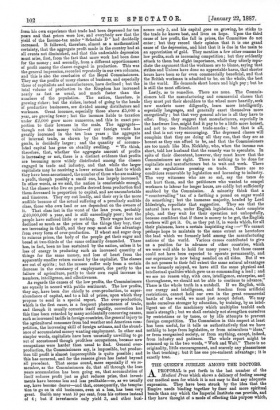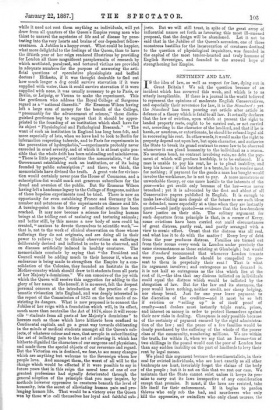THE QUEEN'S JUBILEE AMONG THE DOCTORS.
APROPOSAL is put forth in the last number of the Medical Press which shows a delicacy of feeling among our medical men for which it is not easy to find any adequate expression. They have been struck by the idea that the Empire needs binding together by finer and more spiritual bonds than any which the Imperial Institute can provide, and they have thought of a mode of effecting this purpose which,
while it need not cost them anything as individuals, will yet draw from all quarters of the Queen's Empire young men who thirst to unravel the mysteries of life and of disease by pene- trating into the very hearts and brains of our dependent fellow- creatures. A Jubilee is a happy event. What could be happier, what more delightful to the feelings of the Queen, than to have the fiftieth year of her reign rendered illustrious by providing for London all those magnificent paraphernalia of research by which mutilated, paralysed, and tortured victims are provided in adequate numbers for the purpose of answering the arti- ficial questions of speculative physiologists and baffled
doctors Hitherto, if it was thought desirable to find out how much longer a dog could survive starvation if it were supplied with water, than it could survive starvation if it were supplied with none, it was usually necessary to go to Paris, or Berlin, or Leipzig, or Vienna to make the experiment. This the gentlemen who address the Royal College of Surgeons regard as a "national discredit." Sir Erasmus Wilson having left a large sum of money for the benefit of the College, "presumably for the advancement of science," these distin- guished gentlemen beg to suggest that it should be appro- priated to the founding of an institution which shall have for its object "Physiological and Pathological Research." "The want of such an institution in England has long been felt, and more especially of late, when we have had to look to Berlin for information respecting tubercle, and to Paris for experiments in the prevention of hydrophobia,"—experiments probably never exceeded in cruel severity, and of which it is at least quite pos- sible that the whole drift has been misleading and mischievous. "There is little prospect," continue the memorialists, "of the Government establishing such an institution, or of its being founded by public subscription ;" and there, we think, the memorialists have divined the truth. A great vote for vivisec- tion would certainly never pass the House of Commons, and a subscription-list would mark out generous subscribers for the dread and aversion of the public. But Sir Erasmus Wilson having left a handsome legacy to the College of Surgeons, neither of these hopeless experiments need be tried. There is now an opportunity for even outshining France and Germany in the number and astuteness of the experiments on disease and life. A turning-point in the history of medical science has been reached. It may now become a science for healing human beings at the trifling cost of maiming and torturing animals,' and better still, by this means a new body of men could created, "anxious to devote themselves to scientific work,"— that is, not to the work of clinical observation on those whose sufferings they do not originate, and are doing all in their power to relieve ; but to clinical observations on sufferings deliberately devised and inflicted in order to be observed, and on diseases artificially induced in healthy creatures. The memorialists conclude by saying that "the President and Council would be adding much to their honour if, when an endeavour is being made to strengthen the Empire by a con- solidation of the Colonies, they founded an Institute in the Mother-country which should draw to it students from all parts of her Majesty's dominions." We can conceive of the joy with which the Queen will receive this suggestion for adding to the glory of her name. She herself, it is no secret, felt the deepest personal concern at the introduction of the practice of sys- tematic vivisection into England, and was deeply interested in the report of the Commission of 1875 on the best mode of re- stricting its dangers. What is now proposed is to connect the Jubilee of her reign with a foundation which will, in its effect, much more than neutralise the Act of 1876, since it will recon- cile "students from all parts of her Majesty's dominions" to horrors such as those which have hitherto been confined to Continental capitals, and go a great way towards obliterating in the minds of medical students amongst all the Queen's sub- jects, of whatever colour and race, that scruple in subordinating the art of inflicting pain to the art of relieving it, which has hitherto dignified the characters of our surgeons and physicians, and made them the special objects of our reverence and regard. But the Victorian era is destined, we fear, to see many changes which are anything but welcome to the Sovereign whom her people love. And amongst them, the worst of all will be the change which would be effected if it were possible to say in future years that in this reign the moral tone of one of our greatest professions had signally deteriorated through the general adoption of the principle that you may inquire, by methods however oppressive to creatures beneath the level of humanity, into the secret of alleviating human pain and pro- longing human life. That would be a victory over the Queen won by those w'io call themselves her loyal and faithful sub-
_ .
jects. But we will still trust, in spite of the great array of influential names set forth as favouring this most ill-omened proposal, that the design will be abandoned. Let it not be said that in the Jubilee of the Queen's accession, one of those monstrous beatifies for the incarceration of creatures destined to the question of physiological inquisitors, was founded in the capital of the most tender-hearted and truly humane of English Sovereigns, and founded in the avowed hope of strengthening her Empire.



































 Previous page
Previous page